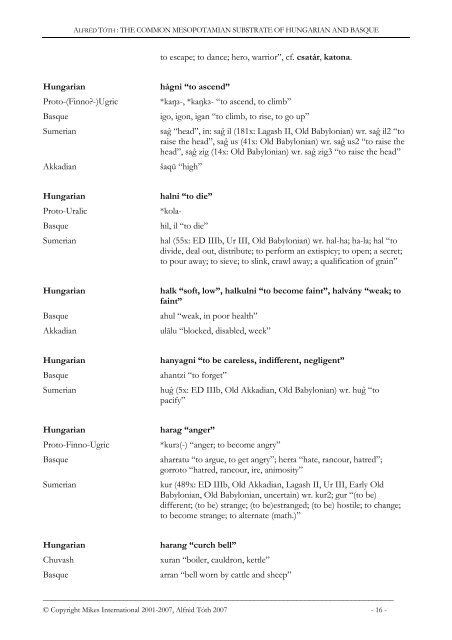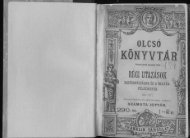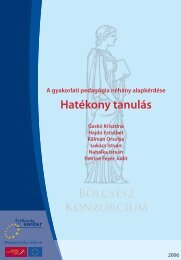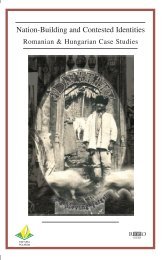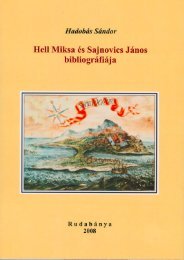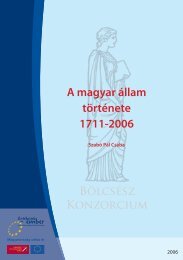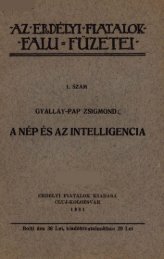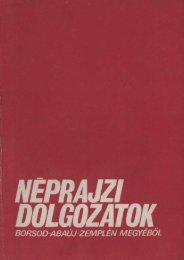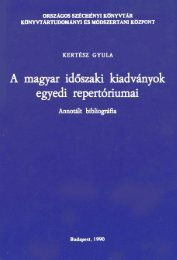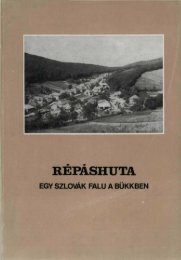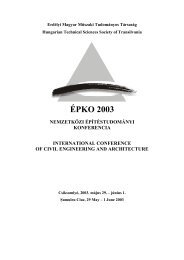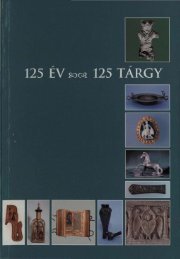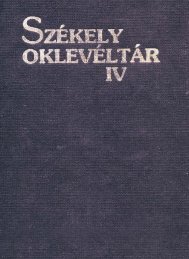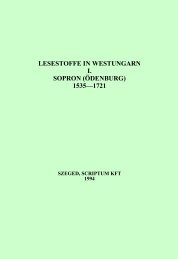The common Mesopotamian substrate of Hungarian and ... - MEK
The common Mesopotamian substrate of Hungarian and ... - MEK
The common Mesopotamian substrate of Hungarian and ... - MEK
Create successful ePaper yourself
Turn your PDF publications into a flip-book with our unique Google optimized e-Paper software.
ALFRÉD TÓTH : THE COMMON MESOPOTAMIAN SUBSTRATE OF HUNGARIAN AND BASQUE<br />
to escape; to dance; hero, warrior”, cf. csatár, katona.<br />
<strong>Hungarian</strong><br />
Proto-(Finno?-)Ugric<br />
Basque<br />
Sumerian<br />
Akkadian<br />
hágni “to ascend”<br />
*kaŋз-, *kaŋkз- “to ascend, to climb”<br />
igo, igon, igan “to climb, to rise, to go up”<br />
saĝ “head”, in: saĝ il (181x: Lagash II, Old Babylonian) wr. saĝ il2 “to<br />
raise the head”, saĝ us (41x: Old Babylonian) wr. saĝ us2 “to raise the<br />
head”, saĝ zig (14x: Old Babylonian) wr. saĝ zig3 “to raise the head”<br />
šaqū “high”<br />
<strong>Hungarian</strong><br />
Proto-Uralic<br />
Basque<br />
Sumerian<br />
halni “to die”<br />
*kola-<br />
hil, il “to die”<br />
hal (55x: ED IIIb, Ur III, Old Babylonian) wr. hal-ha; ha-la; hal “to<br />
divide, deal out, distribute; to perform an extispicy; to open; a secret;<br />
to pour away; to sieve; to slink, crawl away; a qualification <strong>of</strong> grain”<br />
<strong>Hungarian</strong><br />
Basque<br />
Akkadian<br />
halk “s<strong>of</strong>t, low”, halkulni “to become faint”, halvány “weak; to<br />
faint”<br />
ahul “weak, in poor health”<br />
ulālu “blocked, disabled, week”<br />
<strong>Hungarian</strong><br />
Basque<br />
Sumerian<br />
hanyagni “to be careless, indifferent, negligent”<br />
ahantzi “to forget”<br />
huĝ (5x: ED IIIb, Old Akkadian, Old Babylonian) wr. huĝ “to<br />
pacify”<br />
<strong>Hungarian</strong><br />
Proto-Finno-Ugric<br />
Basque<br />
Sumerian<br />
harag “anger”<br />
*kurз(-) “anger; to become angry”<br />
aharratu “to argue, to get angry”; herra “hate, rancour, hatred”;<br />
gorroto “hatred, rancour, ire, animosity”<br />
kur (489x: ED IIIb, Old Akkadian, Lagash II, Ur III, Early Old<br />
Babylonian, Old Babylonian, uncertain) wr. kur2; gur “(to be)<br />
different; (to be) strange; (to be)estranged; (to be) hostile; to change;<br />
to become strange; to alternate (math.)”<br />
<strong>Hungarian</strong><br />
Chuvash<br />
Basque<br />
harang “curch bell”<br />
xuran “boiler, cauldron, kettle”<br />
arran “bell worn by cattle <strong>and</strong> sheep”<br />
___________________________________________________________________________________<br />
© Copyright Mikes International 2001-2007, Alfréd Tóth 2007 - 16 -


